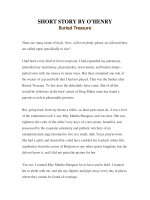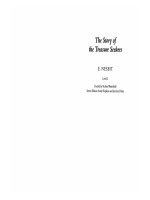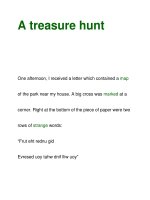Analytics Treasure Hunt 2012_v8-8-2012
Bạn đang xem bản rút gọn của tài liệu. Xem và tải ngay bản đầy đủ của tài liệu tại đây (247.42 KB, 7 trang )
The 2012 Analytics Treasure Hunt
Five analytics puzzles - One coordinate - $100 cash prize
Brought to you by www.puzzlor.com
If you’re a fan of the Thinking Analytics column or just puzzles in general, there is
a challenging new contest that will put your analytics skills to the ultimate test.
Included below are a series of 5 puzzles that focus on common problems
encountered in the mathematics, statistics, and Operations Research fields. Each
puzzle requires a specific solution methodology that you have likely acquired
during your education and career.
Once you have solved each of the puzzles, place their answers into the
corresponding latitude and longitude spaces below. There is a $100 cash prize
hidden at these coordinates.
There is no entry fee and anyone can participate. Additional information can be
found in the “Instructions, rules, and notes” section below and at
www.puzzlor.com.
Input solution here:
Latitude _ _._ _ _ _ _, Longitude -_ _._ _ _ _ _
A B.C D E F G
H I.J K L M N
Puzzle #1 - SurvivOR
Table 1
Getting lost while hiking in the wilderness is a dangerous situation to find yourself in. And making your way back to
civilization is a difficult task that uses up resources quickly. What you decide to take with you while making the journey
back to civilization can determine life or death.
Table 1 shows all of the items that are available to you that will aid you in your hike out of the wilderness. Containers of
Food and Water will give you energy, Shelter will protect you from the elements, and Defense will protect you from wild
animals. Each item has a weight indicated by the red number and each item has survival points indicated by the green
number. You must take exactly one item from each of the four categories (Food, Water, Shelter, Defense). Unfortunately,
the backpack you have has a maximum capacity of 25 kg. Your chance for survival is calculated by adding all of the
survival points together from the items you choose to take with you.
Question #1:
What is the maximum number of survival points you can achieve?
Answer #1: _ _ points
H A
Puzzle #2 - Choose Your Crew
Name
Amy
Bill
Carl
Dan
Eva
Fred
Greg
Henry
Ida
Fishing
2
1
1
5
4
3
1
3
4
Skills
Sailing
5
1
4
2
1
2
3
1
2
Navigation
4
2
3
2
1
5
4
3
4
Salary
$1,000
$1,100
$800
$1,300
$1,300
$1,400
$1,400
$1,000
$700
Table 1
Successfully navigating the waters during sea voyages is a challenging task. A captain’s most important decision is
selecting the right crew for the voyage. A mix of different skill sets is required to sail the ship efficiently, navigate to the
destination, and fish for food along the way.
Table 1 shows a list of crew members that are available for you to hire for the voyage. Each crew member demands a
salary for the voyage and has different skill levels of Fishing, Sailing, and Navigation.
In order for your journey to be successful, you must have a cumulative skill of 15 or more in each of the three skill
categories from all of your chosen crew members. You may choose as many crew members as you like.
Question:
What is the minimum achievable cost for the voyage?
Answer: _ , _ _ _
I
J B C
Puzzle #3 - Traveling Spaceman Problem
Galaxy
ID
1
2
L3
9
N5
Z8
7
coordinates
x
y
z
70
61
100
37
12
96
66
11
12
30
76
86
72
65
33
44
49
90
59
35
72
Table 1
Table 1 shows a list of galaxies that you, as the traveling spaceman, wish to visit. The table shows the coordinates in
three dimensional space where each galaxy exists in the universe.
Question: Starting and ending at one galaxy, in what order should you visit each
galaxy to minimize the traveled distance? You must visit each galaxy and you
cannot visit any galaxy more than once (other than your starting location).
Answer: _ -> _ -> _ -> _ -> _ -> Z8 -> L3
K
E
L
D
Puzzle #4 - Connected and Infected
Figure 1
Disease can spread quickly in a globalized world where increased travel raises the opportunity for transmission. Figure 1
shows a modified map of the world divided into 5 areas. The arrows show the potential path for the spread of disease.
For example, the Blue area can transmit infections directly to the Red and Violet areas but not to the Yellow or Green
areas. Each area can also transmit disease to its own population, indicated by the arrows that circle back onto
themselves.
The populations for each area are as follows: Blue has 0.5 billion people, Red has 0.5 billion people, Violet has 4.0 billion
people, Yellow has 1.0 billion people, and Green has 0.5 billion people. Initially everyone is healthy except for 10,000
people in the Blue area who are infected with a virus.
Each month, 6.1% of the infected people transmit the virus to healthy people along each transmission route. For
example, at the end of month 1, the Red and Violet areas will each have 610 infected people (10,000 infected people
from the Blue area x 6.1%) and the Blue area will have 10,610 infected people (10,000 who were originally infected plus
10,000 x 6.1% from infecting its own population). Infected people stay infected and no deaths occur in this scenario.
Question:
infected?
After how many months is at least half of the world’s population
Answer: _ _ Months
F M
Puzzle #5 - Relief Mission
Figure 1
Coordinating relief efforts after catastrophes such as civil unrest and natural disasters can be a logistically complex
challenge. Delivering relief to people in need is the immediate focus of any disaster management plan.
The map in Figure 1 shows the locations of 20 villagers, each represented by a ‘hut’ icon. The villagers are in need of
relief supplies contained in the crates attached to parachutes. There are two identical relief packages available. The only
delivery option is by air drop. Each package can be dropped on any cell.
After the crates are dropped, each villager will walk to the nearest drop location to pick up relief supplies. Use a direct
line between cells to calculate travel distance. For example, the distance between a1 and a2 is 1km and the distance
between A1 to B2 is 1.41 km. Assume that each crate contains an unlimited amount of relief supplies.
Question: Which two drop locations will minimize the total distance that all
villagers must travel?
Answer: _ _ , h _
G
N
Instructions, rules, and notes
Instructions
Solve the 5 puzzles in this document and place their answers in the latitude and longitude spaces on page 1. When the
puzzles are correctly completed, the coordinates will indicate the location of a hidden treasure.
Rules
1.) You can reach the coordinates easily by traveling on public roads and land. The treasure is NOT hidden on private
property. If your coordinates take you to private land (residential homes, businesses, commercial buildings, etc.) your
solution(s) are incorrect.
2.) Minimal effort is required to retrieve the treasure from its hiding place. You do not need to dig or move anything.
3.) The first person (or team) to retrieve the treasure is the winner. Once the treasure is found, the contest is over.
4.) The puzzlor is not responsible for any injuries, damages, or costs incurred while participating in this contest.
5.) If you find the treasure, please send me an email () indicating that you have found it so I can
update the puzzlor web site.
6.) Have fun and be safe!
Notes
A GPS enabled device will be helpful in leading you to the treasure’s coordinates.
The contest is active until someone correctly completes all of the puzzles and retrieves the treasure from its
hiding space. Notification will occur on the puzzlor web site (www.puzzlor.com) when someone has retrieved
the treasure.
Additional questions can be sent to
Author
John Toczek is the manager of Decision Support and Analytics for ARAMARK Corporation in the Global Risk Management
group. He earned a bachelor’s degree in chemical engineering at Drexel University (1996) and a master’s degree in
operations research from Virginia Commonwealth University (2005).









